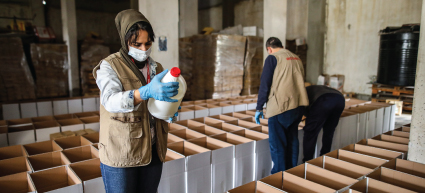Ebola hasn’t yet spread to the areas where ActionAid works in DRC, but we are helping these communities to prepare. We’re working with grassroots women’s groups who are rooted in local communities, and who have the trust of local people. Together we’re talking to families on how to prevent and control the spread of Ebola, and distributing important updates from the Ministry of Health in local languages.
We are getting ready to expand this awareness-raising work, including tackling misconceptions about the disease in the communities we work in. We’re particularly working with women, because they are often the first responders in emergencies such as this.
Where ActionAid DRC is working:
AA DRC works in Nyiragongo Territory, North Kivu Province. No case is reported here at the moment, but preventative measures have been put in place by UNICEF together with the local government.
ActionAid DRC’s response focuses on:
- Training women on how to prevent Ebola: We’ve incorporated education on Ebola into our existing work with poor rural communities and particularly local women’s groups in North Kivu. Through our network of women’s groups, we’ve been giving these communities regular updates and training women on how to prevent Ebola, looking at the importance of actions like hand washing.
- Working with government and other organisations at state and local levels to ensure that accurate, clear information is shared to communities, in various languages. We’ve distributed materials from the Health Ministry to women’s groups in all the communities we work in in this area.
- Working closely with ActionAid Uganda to help control the spread of the disease across borders.
- Keeping staff safe: Updating ActionAid DRC’s staff and partners on the situation regularly and ensuring they’re protecting themselves and others from infection. Our offices and vehicles are fitted with hand sanitizers, basins for hand washing, and Health Ministry information on Ebola.
Background on DRC and AA’s work there:
- The DRC is one of the poorest countries in the world. Over 87% of the population live below the poverty line, and ongoing conflicts have driven millions of people from their homes.
- The majority of the country’s poorest people live in rural areas, where limited access to clean water and sanitation cause outbreaks of deadly diseases like cholera.
- Women and girls in rural areas are very vulnerable to sexual violence – millions of women have been raped and abused over years of conflict. Half of all women aged 15-24 are illiterate. Nearly 40% of girls are married before the age of 18.
- ActionAid DRC operates in 15 areas across the North and South Kivu Provinces, working closely with local networks.
- We provide psychological support to survivors of sexual violence, and run workshops with the police and military to find ways to ensure that laws against sexual violence are understood and enforced.
- We also build the resilience of communities affected by conflict by providing agricultural tools, seeds and training to help them become self-sufficient.
As an example, AA DRC staff recently ran a Q & A session with women in Nyiragongo (north of Goma) on prevention against Ebola, using images approved & edited by the Ministry of Health and the World Health Organization on the following themes:
- Sign of illness and behavior;
- How the virus gets transmitted from animals to humans;
- How the virus gets transmitted from human to human;
- How the virus gets transmitted from virus by handling the body of a dead person infected, their clothes or other objects;
- Preventive measures against the Ebola virus (the disinfection with bleached water of soiled objects and places);
- Prevention by hand washing techniques (key moments of hand washing with soap and frequency for hand washing in public places);
- Prevention by vaccination;
- Safety measures in schools.
At the end of the training session, the women were encouraged to go out and pass on the information to the community and members of their respective families (i.e. husbands, children, and other community members).
Saani Yakubi, ActionAid DRC Country Director, is available for interviews.



